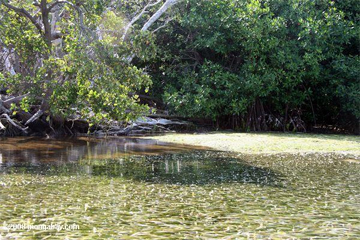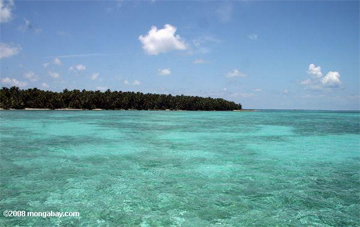Services provided by coral reefs and mangroves in Belize are worth US$395 million to US$559 million per year, or 30 to 45 percent of the Central American country's GDP — according to a new report released by the World Resources Institute and the World Wildlife Fund.
The study assessed the value of ecosystem services — including flood and erosion control and protection against storm surge — provided by reefs and mangroves as well as associated economy activities from fisheries and tourism.
The authors estimate that reef- and mangrove-associated tourism contributes US$150 million and US$196 million to Belize's economy each year, while reef- and mangrove-dependent fisheries contribute a US$14 million to US$16 million. Coral reefs and mangroves respectively provide $120-180 million and $111-167 million in avoided damages and protection each year.
 Mangroves of Turneffe Atoll in Belize
|
"Putting a dollar value on the goods and services provided by reefs and mangroves helps to translate them into a language that everyone speaks," said Lauretta Burke, a senior associate at WRI. "Hopefully, these findings will contribute to well-informed decisions regarding the management of these critical resources."
The report notes that despite the economic importance of these ecosystems, they are threatened by coastal development, over-fishing, and pressures from tourism. The authors say that the country's marine protected areass system is under-funded and under-staffed.
"The goods and services offered by coral reefs and mangroves are frequently overlooked or underappreciated in coastal investment and policy decisions," said Emily Cooper, a research associate at WRI and lead author of the study. "The amount currently invested in protecting Belize's coral reefs and mangroves is very small when compared to the contribution of these resources to the national economy."
"Belize's reefs and mangroves offer crucial socio-economic benefits but are already threatened by overuse, degradation and fragmentation. Climate change will undoubtedly compound these through increased frequency of impacts from mass bleaching and storm occurrences, as well as coastal erosion and sedimentation," said Nadia Bood, reef scientist and climate change officer for WWF-Central America. "This makes urgent the need to act now to alleviate human threats and increase the resilience potential of these very importance ecosystems."
The report is available at www.wri.org.















